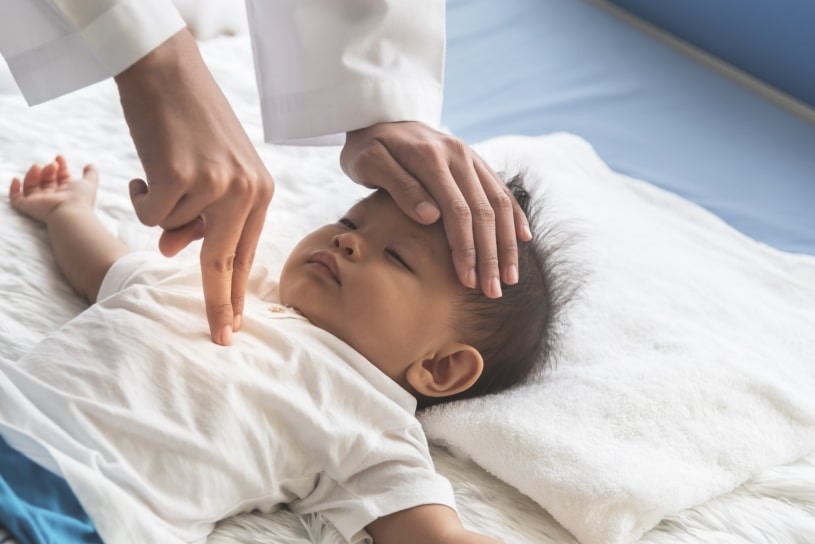
High fever in children: what is important to know
Fever is a rise in body temperature above normal values and is an ally of the child because it helps eliminate the germs and viruses that are causing it
When it is high, above 38°, however, it arouses concern and fear in parents.
The causes of fever
The causes are very variable and change depending on:
- the child’s age;
- his or her placement in the community.
Fever usually anticipates the onset of the symptoms that cause it by about 48-72 hours.
This is why, if general conditions permit, it is important to postpone the clinical evaluation by the paediatrician by 2-3 days.
CHILD HEALTH: LEARN MORE ABOUT MEDICHILD BY VISITING THE BOOTH AT EMERGENCY EXPO
The symptoms accompanying fever are variable:
- cough and cold;
- otalgia;
- headache;
- abdominal pain;
- urinary disorders;
- vomiting and/or diarrhoea.
Related symptoms may not even appear immediately, but sooner or later one of them will appear, pointing to the cause of the febrile state.
How to measure fever in children
A traditional biological mercury thermometer (axillary and rectal sites) or an ear thermometer can be used to measure fever.
The ideal site for taking a temperature is the axillary site, but this takes time.
In this case, the biological mercury thermometer should be kept in place for at least 3-4 minutes until the column stops.
Alternatively, the ear temperature can be measured with the appropriate thermometer, from which 0.5°C must be subtracted to obtain the correct temperature.
When is it necessary to administer an antipyretic?
Above 38°C actual, i.e. axillary temperature, is considered a fever and above this temperature an antipyretic should be administered.
Remember: the temperature if taken internally (i.e. rectally with a traditional biological mercury thermometer or ear thermometer) must be scaled by 0.5°C.
So, for example, a rectal temperature of 38.2°C corresponds to an actual temperature of 37.7°C and should not be treated.
What to do in the event of a high fever in children
In the event that it exceeds 38.5°C, it is good to
- hydrate the child correctly;
- do not force feeding: a feverish child often feels nauseous and forcing feeding evokes the vomiting reflex;
- in the case of food cravings prefer simple and complex sugars (carbohydrates), avoid fats;
- uncover the child in order to promote heat exchange with the environment;
- administer antipyretics at the correct dosage and frequency, remembering that antipyretics are effective if they cause the temperature to drop by about 1-2°C.
In the event that these measures cannot be applied, it is a good idea to contact the paediatrician.
Fever and home remedies: do they work?
Ice packs on the forehead and cold sponges are old remedies that do no good and are generally not tolerated by young patients, so they tend to be avoided.
How long can high fever last in children?
Normally the fever wears off in 72 hours, if its nature is viral; otherwise, if it persists, a clinical evaluation is necessary for the correct prescription of a more suitable antibiotic.
When to go to hospital?
Access to the emergency room, especially during seasonal epidemic periods, should be avoided as much as possible, resorting to it only after contact with the treating paediatrician or when the child’s condition makes it necessary, i.e. after:
- difficulty in feeding
- reduced diuresis;
- decline in general condition.
Read Also
Emergency Live Even More…Live: Download The New Free App Of Your Newspaper For IOS And Android
Symptoms Of Emergencies In Children: Fever
What Is Traumatic Brain Injury (TBI)?
Paediatric Toxicological Emergencies: Medical Intervention In Cases Of Paediatric Poisoning
Paediatric Seasonal Illnesses: Acute Infectious Rhinitis
Pediatrics: What To Do In Case Of High Fever In Children?
Seasonal Illnesses: What To Eat When You Have Flu?
Plaques In The Throat: How To Recognise Them
Tonsillitis: Symptoms, Diagnosis And Treatment
Sore Throat: How To Diagnose Strep Throat?
Sore Throat: When Is It Caused By Streptococcus?
Pharyngotonsillitis: Symptoms And Diagnosis
Flu Vaccine For Children? Paediatricians: ‘Do It Now, Epidemic Already Started’
Paediatrics / Recurrent Fever: Let’s Talk About Autoinflammatory Diseases
Q Fever: What It Is, How To Diagnose It And How To Treat It
Respiratory Allergies: Symptoms And Treatment
RSV (Respiratory Syncytial Virus) Surge Serves As Reminder For Proper Airway Management In Children
Acute And Chronic Sinusitis: Symptoms And Remedies
Symptoms And Remedies Of Allergic Rhinitis
Respiratory Or Food Allergies: What Is The Prick Test And What Is It For?
Anaphylactic Shock: What It Is And How To Deal With It
Sinusitis: How To Recognise That Headache Coming From The Nose
Sinusitis: How To Recognise And Treat It
Flu Vaccine For Children? Paediatricians: ‘Do It Now, Epidemic Already Started’
Rhinitis, Inflammation Of The Nasal Mucous Membranes


